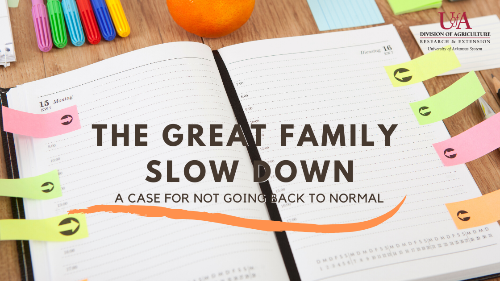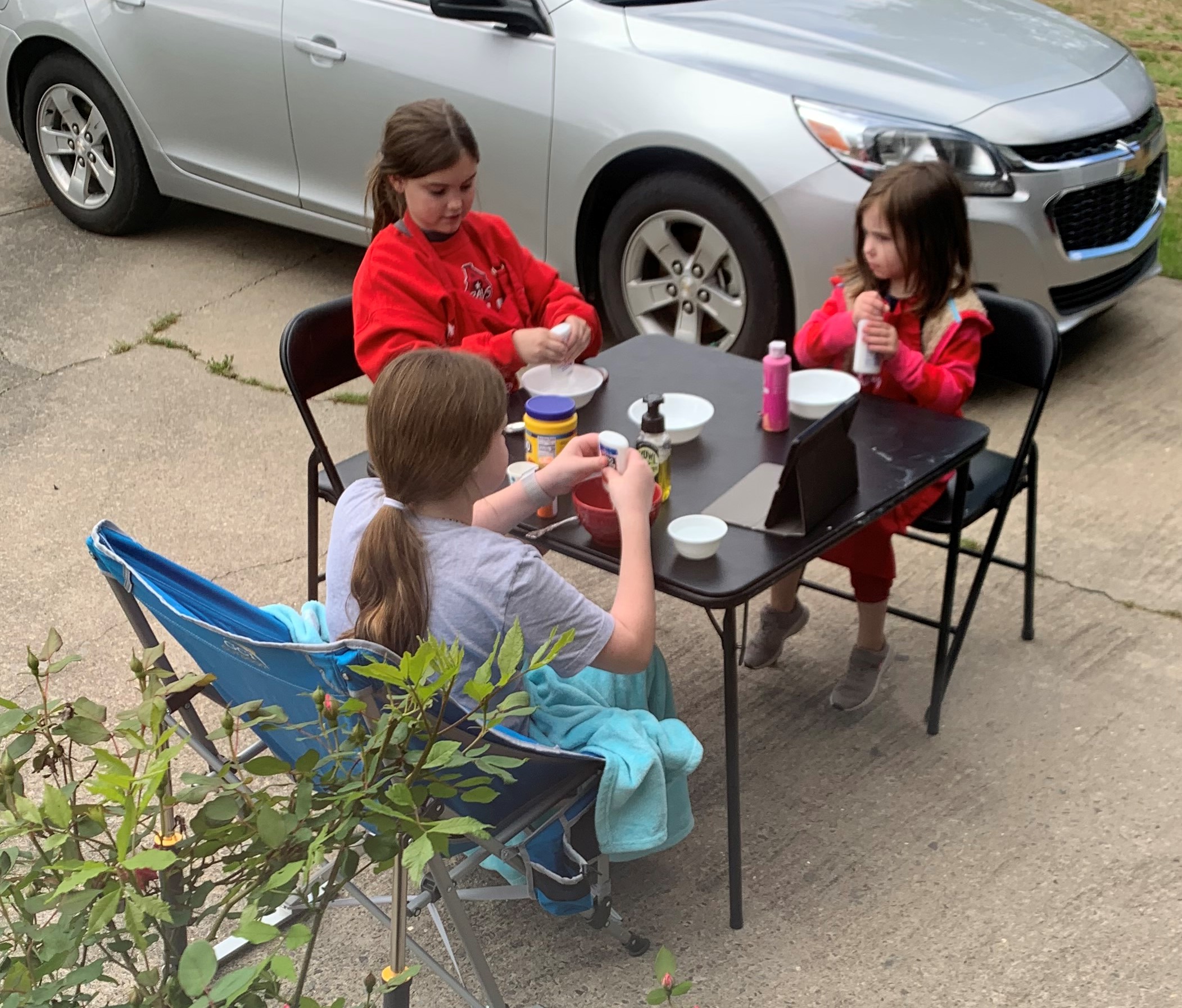Contact
Assistant Professor-Family Life Specialist
Phone: (501) 671-2202
Email: bschrick@uada.edu
University of Arkansas System Division of Agriculture
Cooperative Extension Service
2301 S. University Avenue
Little Rock, AR 72204

The Great Family Slow Down -- A Case for Not Going Back to Normal
“I feel like being in quarantine together has made us better friends.”
I overheard my 10-year-old say this to her 13-year-old sister while they sat together at the dining table and did each other’s nails. They, like many siblings, tend to go to extremes in their relationship. One moment they’re having a great time together, and the next moment someone is screaming. Add to the mix their 5-year-old sister, and the relationship dynamics become even more unpredictable.
I sat a few feet away, busy working on my laptop, and smiled to myself. I started to choke up a little until the big sister said, “I don’t." Then, in response to her sister's scandalized look she said, "Just kidding.” The moment was kind of ruined, but middle sis had already said something I had been thinking for weeks: Even though quarantine/school at home/social distancing/telecommuting has been rough on our family, there are some positives that we can try to focus on and things I want to hold onto even when we can "get back to normal."
In the time before, we were a super busy family. Probably not as busy as some, but that was intentional. We limited our kids to one school extracurricular activity and one outside activity. With three kids and two full-time jobs (one of which required a 40-minute commute and the other primarily evenings and weekends), we were busy enough without letting our kids have crazy schedules too. But even with only one activity plus school stuff, there was plenty of time spent in the car and waiting for kids to finish things and calendars so full that only one parent could be here or there because the other had to be somewhere else.
Mid-March is normally when things ramp up.
Spring sports start just as winter sports are ending. Extra practices begin for end-of-year activities. Concerts. Games. Recitals. And don’t forget parents’ work meetings and travel. But this year, mid-March was when everything came to a halt. The calendar started clearing. Things moved from in-person events that required driving and sitting and waiting and driving somewhere else to everything being at home. My 40 minute commute became a one-minute walk to my desk. My husband’s schedule of evening and weekend and overnight events became Zoom calls or were cancelled completely. We went from 10 or so meals a week at home to 21 (plus who knows how many snacks).
At first, we mourned our schedules.
We missed everything and everyone, and every time something popped up on the calendar,
I felt a renewed sense of sadness at all the stuff we “should be doing.” But after
the days turned into weeks and the weeks turned into months, I’ve noticed something:
We don’t miss being busy. Sure, we miss our favorite activities. We miss our friends. We miss interacting with
people who don’t live with us. But, we do NOT miss running around all the time. We
do not miss leaving one activity to drive straight to another and hope we aren’t late.
We have been forced to slow down.

I realize this is a fairly specific set of circumstances: My husband and I are both telecommuting, and none of our child care options stayed open or even reopened when some others returned.
Some families have gone right back into being busy or stayed busy the whole time due to continued or changing work environments. Some have kept right on going as though nothing has changed despite all the evidence to the contrary. But, if your family is like mine, I challenge you to consider a few things as you decide whether you want to "get back to normal."
- How busy do you want to be?
- What do you look forward to, and what do you dread?
- What do your kids truly enjoy, and what do you have to drag them to?
- Who are you looking forward to reconnecting with, and who have you enjoyed a break from?
- What have you noticed in your family dynamic as you’ve spent more time together? Positives and negatives?
- What do you want to hold onto from this “slow down” time?
- What will you (your child) gain or lose by adding [fill in the blank]?
- What do you really miss from your activities?
There are certain things that will not be optional.
If you are telecommuting, there will likely come a time when you’re in an office again. If your work situation landed in furlough or job loss, you may be looking for work or even working more than one job to make up for the income loss. But now is a time to take stock and really look at where you’re willing to spend your family’s time, energy, and money.
Despite state and federal officials declaring the opening of the economy, COVID-19 has not gone anywhere. It will likely be longer than anyone wants to acknowledge before it will be safe to move in the world like we did in the time before. Going “back to normal” will not be safe for a while, and by the time it is, we may have adapted to the current situation for good. (Remember when you could walk straight to the gate to pick up a friend at the airport? No? Pre-9/11 we could do that.)
Generally, we should approach each decision in terms of calculated risk. What is the risk to myself/my family/my child? Is the outcome worth the risk?
There are some risks that are unavoidable, but even those can be lessened by proper hygiene practices and protective steps like wearing masks or maintaining a safe distance from others.
Things like returning a child to daycare so you can return to work, though risky, might be necessary. The alternative may be unemployment and all the negative outcomes that follow. If you work in a job that has you in contact with the public, you may already be in a high risk situation. Mitigating risk for you and your family may mean avoiding other types of interaction in order to keep your footprint (bubble) contained.
It is also worth checking into whether the current form of whatever activity you are considering is worth the risk based on how much you have to adapt in order to do it. It is highly likely that whatever you are missing does not exist in the form you remember right now.
Finally, ask yourself and your family: What do we really miss?
When you ask yourself what you’re really missing, you may find that your motivation for participating in something is not what you thought. You might assume your child misses playing baseball, but it’s really that you miss watching your child playing baseball. You might think you miss working out, but you really miss the time you have alone when you go to the gym. Before adding activities back to your schedule, consider whether you could meet the same need with a safer or less costly alternative activity.
Families have already largely adapted to the changes in ways we interact, and it is very likely that we won’t ever be the same again. I argue that, although it may feel hard right now, it’s probably for the best. Slowing down as a family has so many benefits. Giving kids down time, limiting schedules, and allowing kids to get bored are all backed by research indicating their positive outcomes. Kids who are overscheduled are anxious, easily bored, and overwhelmed. In forcing us to slow down, the pandemic has allowed us to see what we're missing (or at least try on a slower pace). Even for those who were willing to just barrel through like nothing was happening, things got cancelled and they were forced to adapt too. Let’s take this time to ensure that we don’t go straight back into the same negative habits and hold onto some of the best parts of this time. The "new normal" can just be "normal."
Resources:
Arkansas Department of Health: https://www.healthy.arkansas.gov/programs-services/topics/novel-coronavirus
Extension COVID-19 Resources: https://www.uaex.uada.edu/life-skills-wellness/health/covid19/default.aspx
CDC: https://www.cdc.gov/coronavirus/2019-ncov/prevent-getting-sick/prevention.html
Slow Down Family Time: https://www.becomingminimalist.com/more-family/